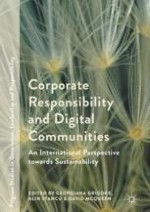This book explores conceptualizations of CSR and sustainability in the digital economy, focusing upon points of intersection between CSR and online communities. Reflecting on new areas of responsibility that organisations must face in a globalised economy, the contributions explore the ways CSR is being communicated, challenged and reshaped in a rapidly evolving online context. Up-to-date research from around the world shows how diverse communities, citizens and stakeholders are engaging with, and making demands on, organisations in novel ways that pay little respect to international borders. With online communities increasingly influencing the way in which business is carried out and perceived, the case studies explored here offer a useful indication of the variety of new developments and controversies that have emerged in the field of CSR. This book will appeal to postgraduate students and researchers of CSR and CSR communications, as well as communication, public relation and corporate responsibility practitioners.
